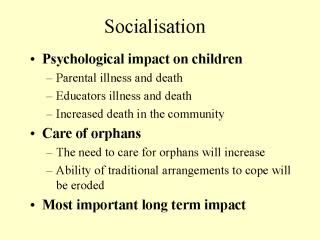 |
One of the
greatest challenges facing a society with a large number of orphans is to ensure that
these children become well-adjusted and valuable members of society. However, there are a
number of obstacles to achieving this outcome. Firstly, the psychological impact of
parental and educator/role model illness and death on children should not be
underestimated. There is good evidence to suggest that traditional mechanisms and
strategies are coping well, but there is growing concern about the resilience of these
systems. In addition there are reports that children cared for by extended family members
or fostered out, are stigmatised and discriminated against - for example, they receive
less food than other children and are given more chores. Other studies have found that
children raised without sound role models are more likely to engage in delinquent
behaviour with repercussions for society at large. |
